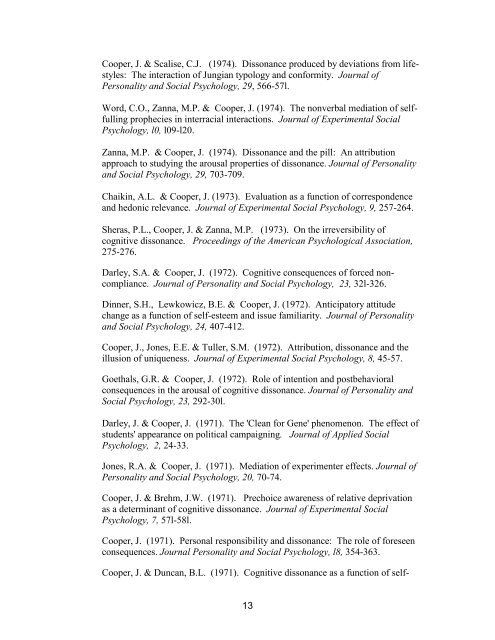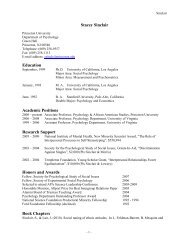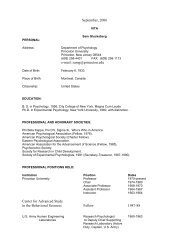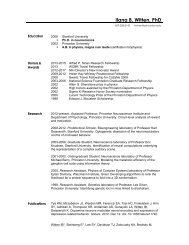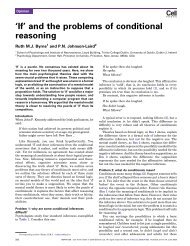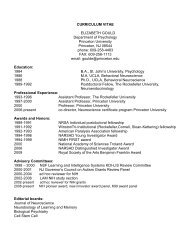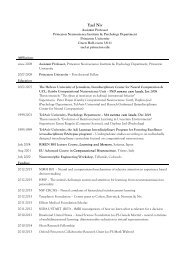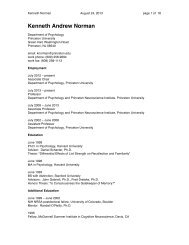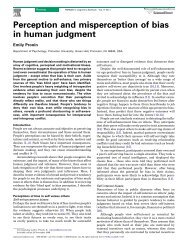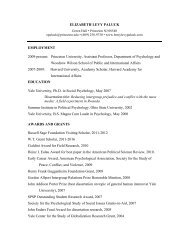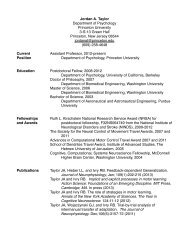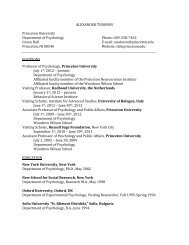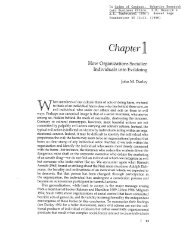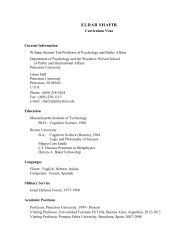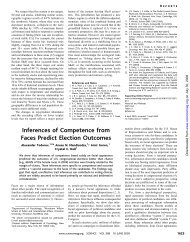VITA Joel Cooper - Princeton University - Department of Psychology
VITA Joel Cooper - Princeton University - Department of Psychology
VITA Joel Cooper - Princeton University - Department of Psychology
Create successful ePaper yourself
Turn your PDF publications into a flip-book with our unique Google optimized e-Paper software.
<strong>Cooper</strong>, J. & Scalise, C.J. (1974). Dissonance produced by deviations from lifestyles:The interaction <strong>of</strong> Jungian typology and conformity. Journal <strong>of</strong>Personality and Social <strong>Psychology</strong>, 29, 566-57l.Word, C.O., Zanna, M.P. & <strong>Cooper</strong>, J. (1974). The nonverbal mediation <strong>of</strong> selffullingprophecies in interracial interactions. Journal <strong>of</strong> Experimental Social<strong>Psychology</strong>, l0, l09-l20.Zanna, M.P. & <strong>Cooper</strong>, J. (1974). Dissonance and the pill: An attributionapproach to studying the arousal properties <strong>of</strong> dissonance. Journal <strong>of</strong> Personalityand Social <strong>Psychology</strong>, 29, 703-709.Chaikin, A.L. & <strong>Cooper</strong>, J. (1973). Evaluation as a function <strong>of</strong> correspondenceand hedonic relevance. Journal <strong>of</strong> Experimental Social <strong>Psychology</strong>, 9, 257-264.Sheras, P.L., <strong>Cooper</strong>, J. & Zanna, M.P. (1973). On the irreversibility <strong>of</strong>cognitive dissonance. Proceedings <strong>of</strong> the American Psychological Association,275-276.Darley, S.A. & <strong>Cooper</strong>, J. (1972). Cognitive consequences <strong>of</strong> forced noncompliance.Journal <strong>of</strong> Personality and Social <strong>Psychology</strong>, 23, 32l-326.Dinner, S.H., Lewkowicz, B.E. & <strong>Cooper</strong>, J. (1972). Anticipatory attitudechange as a function <strong>of</strong> self-esteem and issue familiarity. Journal <strong>of</strong> Personalityand Social <strong>Psychology</strong>, 24, 407-412.<strong>Cooper</strong>, J., Jones, E.E. & Tuller, S.M. (1972). Attribution, dissonance and theillusion <strong>of</strong> uniqueness. Journal <strong>of</strong> Experimental Social <strong>Psychology</strong>, 8, 45-57.Goethals, G.R. & <strong>Cooper</strong>, J. (1972). Role <strong>of</strong> intention and postbehavioralconsequences in the arousal <strong>of</strong> cognitive dissonance. Journal <strong>of</strong> Personality andSocial <strong>Psychology</strong>, 23, 292-30l.Darley, J. & <strong>Cooper</strong>, J. (1971). The 'Clean for Gene' phenomenon. The effect <strong>of</strong>students' appearance on political campaigning. Journal <strong>of</strong> Applied Social<strong>Psychology</strong>, 2, 24-33.Jones, R.A. & <strong>Cooper</strong>, J. (1971). Mediation <strong>of</strong> experimenter effects. Journal <strong>of</strong>Personality and Social <strong>Psychology</strong>, 20, 70-74.<strong>Cooper</strong>, J. & Brehm, J.W. (1971). Prechoice awareness <strong>of</strong> relative deprivationas a determinant <strong>of</strong> cognitive dissonance. Journal <strong>of</strong> Experimental Social<strong>Psychology</strong>, 7, 57l-58l.<strong>Cooper</strong>, J. (1971). Personal responsibility and dissonance: The role <strong>of</strong> foreseenconsequences. Journal Personality and Social <strong>Psychology</strong>, l8, 354-363.<strong>Cooper</strong>, J. & Duncan, B.L. (1971). Cognitive dissonance as a function <strong>of</strong> self-13


